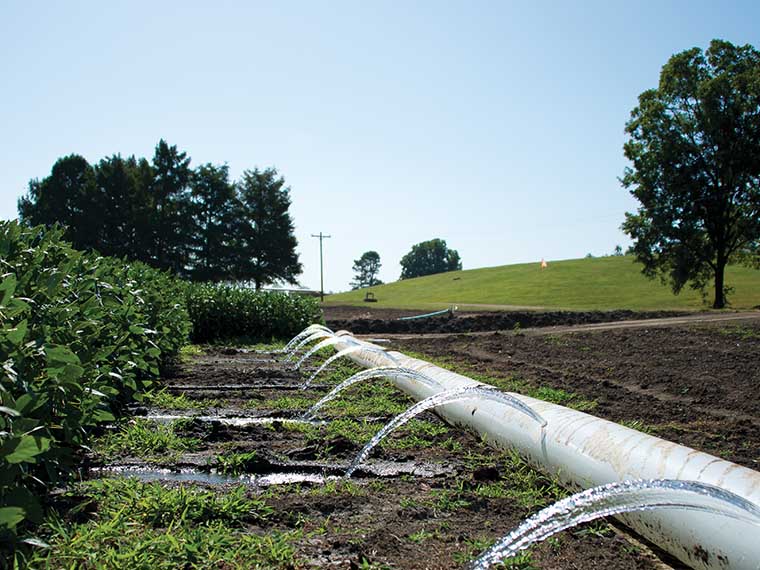Founded in 1964, the Mississippi Water Resources Research Institute (MWRRI) has long been a strategic partner of the Mississippi Agricultural and Forestry Experiment Station (MAFES). Dr. Jason Krutz, the director of MWRRI, previously served as a MAFES irrigation scientist, and is also now the interim director of the newly-created MAFES/USDA-ARS Mississippi River Valley Alluvial Aquifer Water Center at the Delta Research and Extension Center's West Farm.
Krutz has made it the focus of his career to help producers better utilize water. Now he is able to protect this natural resource on multiple fronts.
The MWRRI is supported by a Federal-State partnership, authorized by the Water Resources Research Act of 1984. The mission of MWRRI is to increase water efficiency, protect coastal waters, improve water quality, and conserve natural resources.
The MWRRI actively works with MAFES scientists in each of these areas. In water efficiency and conservation of natural resources, MAFES scientists and MWRRI are examining several projects designed to decrease water usage while maintaining crop yield and profitability. One successful program developed by Krutz is the Row-Crop Irrigation Science Extension and Research program or RISER.
"RISER is a suite of irrigation management practices including computerized hole selection, surge flow irrigation, and sensor-based irrigation scheduling," Krutz said. "The program has been a success in Mississippi, where producers have decreased water usage by 25 percent. It is now being adopted in Arkansas, Louisiana, Missouri, and Tennessee."
MAFES scientists and the MWRRI are also examining several row crop research programs to improve irrigation efficiency, including work in soybean, rice, cotton, and cover crops.
"The research I have done in MAFES and now as MWRRI director collaborating with MAFES scientists has saved producers money and reduced the volume of water being withdrawn from the Mississippi Alluvial Valley," Krutz said. "It is rewarding to conduct research that improves water conservation while also maintaining farm profitability."
An exciting new project to improve water quality involves numerous university units, including MAFES and MWRRI. The Red Bud-Catalpa Creek Watershed Restoration and Protection project calls for the installation of 24 best management practices in three delineated critical management areas, including a monitoring program to quantify the effectiveness of the installed practices. MWRRI funded one of the studies under the project's umbrella to assess and predict stream processes within the watershed.
Catalpa Creek flows through campus, where stormwater runoff from parking lots, roads, and construction contribute to the watershed. The creek then flows through H.H. Leveck Animal Research Center and the Bearden Dairy Research Unit until it reaches Tibbee Creek.
"Studying the Catalpa Creek watershed is like a perfect storm of water management issues. You have campus activity plus beef, dairy, and poultry livestock production, all of which flow to Catalpa Creek, a stream that was categorized by the Mississippi Department of Environmental Quality as impaired due to sediments from the headwaters that confluence with Tibbee Creek," Krutz said. "Our work in Catalpa Creek is designed to demonstrate the effectiveness of best management practices, while restoring the streambank and reducing water impairment."
To protect coastal waters, the MWRRI works with MAFES on the Southern Extension and Research Activities committee number 46 (SERA-46) Hypoxia Task Force. Read more about SERA-46 in the River Runs Through It feature on page 9.
These are just a few of the projects in which MWRRI and MAFES are engaging to improve water quality and quantity throughout the state. Working together, this strategic partnership strives to protect the world's most valuable natural resource-water-while improving the livelihood of the state's and region's residents.
Find out more about MWRRI at www.wrri.msstate.edu.

